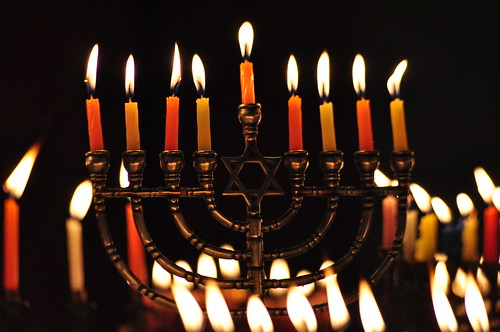It’s been a while since there has been a good bit of controversy about Jewish assimilation, but thankfully American Jews and Israeli politics are out of sync just enough to justify talking about it again. The latest blip, I think, challenges American Jews much more than any other public effort since the spread of the internet. The Israeli government wants its citizens back home, and it will take a few swipes at the drawbacks of American life in order to do it:
Translation:
Grandmother: “How are you?!”
Granddaughter:”I’m okay!”
Grandmother: “What holiday is it? Do you know?”
Granddaughter: “Christmas!”
::Depression::
Voiceover: “They’ll always be Israelis. Their kids won’t. Help them come back to Israel.”
The video is a product of the Israeli Ministry of Absorption that has devoted more incentives than ever before to Israelis living abroad to return. Israelis and Palestinians are competing in population, and the demographics of the region might have major implications in the future (if Jews were to lose their majority). That issue, however, is not what I find interesting about the video.
The reactions I have seen have been visceral. Israeli (Hebrew) comments on Youtube have been angry. The reactions in English I see on Facebook have been more refined, but equally opposed to the ideas in the video.
Personally, I am confused. The reality is, despite what people might want to believe, is that the video is illustrating something that has happened in the United States. Growing up, way outside of the Orthodox circles and many non-Ortho but Judeo friends I have today, I couldn’t tell you the honest difference between Christmas and Chanukah. I was probably as old as the kid in the video, but until 10 I was pretty content. “All religions are the same” I thought, “they just check different boxes when asked certain questions.” This was all elementary, but bear in mind I didn’t go to Hebrew School (much less Sunday School), and had to ask my parents to get more into the holidays they passively celebrated. Even at 10, I felt like I was laboring or annoying.
I got into the questioning business later and then chose my path to Judaism. The issues I faced were personal, familial and theological. Never mind the fact I had to break into the Jewish community when virtually none lived in my hometown. The video has a point whether or not Israelis or Americans want to acknowledge it. As an ad campaign, it won’t do much convincing. If Israelis found reasons to leave to a foreign country, they’ll be put off being insulted into returning to their home one.
The reactions I have seen to the video seem naïve to me, though. Some of the more liberal friends I have seem to be appalled by it. We have to appreciate there is a contradiction there, since none of these friends would marry a non-Jew or celebrate Christmas. They are just as aware of the problems posed by intermarriage and cultural assimilation, but just can’t accept this advert. Without pretending to be any more an expert on assimilation or PR than they are, I see a lot of subtopics to debate here. Can we honestly think the United States will preserve our religion and will its culture respect the integrity of our beliefs? Do we know for sure that even at our most conservative, we can trust minority Judaism has a fighting chance to influence our community’s kids when competing with a majority’s culture?

I already find any sort of combo of Christmas and Chanukah to be ludicrous. You should wish someone Happy Holidays, but does it ever make sense to go further than that. Many families mix the two holidays. Chanukah’s popular theme is to resist another culture’s imposing on your own, and Christmas marks a fork in the road between Judaism and a system that nullifies the former’s central tenets. The term “Christmukkah” is a perversion. In my opinion, American Jews spend more time trying to put menorahs in the public eye and barely a second on the actual history or meaning of the holiday.
“They tried to kill us. We won. Let’s eat.”
No. Chanukah is beyond that. Chanukah was first celebrated as a stand-in for Sukkot. The reason it has eight days is honestly debated. It has multiple sources. It’s almost like a comic book reinventing the way its main characters became superheroes. Just as Shamai implies in the Talmud, and as Josephus and Books of Maccabees bring out in the open, Chanukah’s eight days mirror those of Sukkot and Simchat Torah. The Seleucid Greeks, who ruled the country, still held control of the Temple when Sukkot came around. By December/Kislev, the ground had been retaken. Even though there was no requirement, the victorious rebels marked Sukkot in a more wintery way – an eight-day festival that the Bible considers a holiday that will one day be observed by the entire world.
If anything, there is something fitting to that description and pegging it to Chanukah. American Jews might find something resonates in that message – I do. Chanukah seems to be a second chance at a holiday that has significant implications for Judaism. It takes the religion out of its tribal, nationalist motif and forces it to be more universal.
Gedalyah Reback graduated from Rutgers University with a Bachelor’s Dgeree in Middle Eastern Studies. He has made Aliyah and was married in 2011. He is pursuing a Master’s Degree. His column, Long-Range Israel, usually appears here on alternating Tuesdays – its late publication is due to an editorial oversight, for which we apologize.
